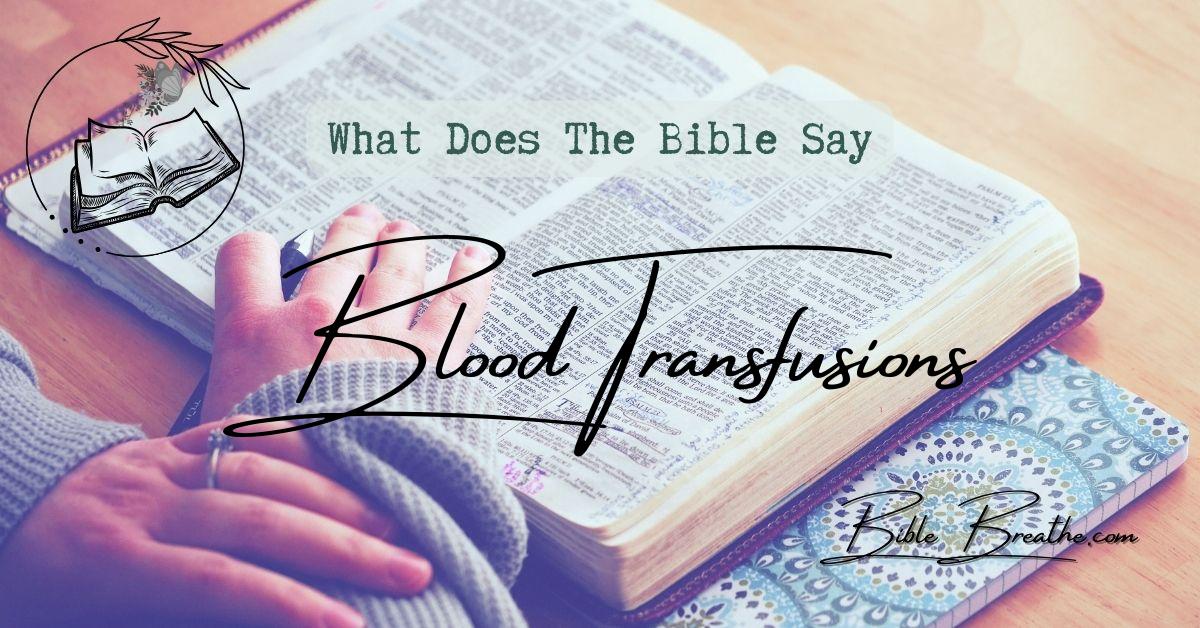Ever wondered what the Bible says about blood transfusions?
It’s like mixing the ancient with the modern, faith with science.
Picture it: the pages of the Good Book whisper about blood in the context of old-school worship and deep-diving into biblical laws.
Leviticus drops some knowledge about the no-no of blood consumption.
Now, let’s fast forward to today’s era of life-saving medicine and high-tech hospitals.
In James 5:14-15, it talks about anointing and prayers for the sick, but here’s the twist—where does it stand on medical practices like blood transfusions?
That’s where individual conscience comes into play.
It’s like a faith crossroads, my friends.
We’re exploring how these biblical principles fit with today’s health care, making choices, and navigating our Godly principles.
So, let’s journey through this crossroads of faith and medicine, and by the end of this, you’ll have a clearer view of how the Bible meets the 21st century.
🌟
Key Takeaways
- The Bible does not specifically address modern medical practices such as blood transfusions, as it was written in a historical and cultural context that predates these medical advancements.
- Understanding the biblical stance on blood necessitates considering the historical context in which the scriptures were written. Blood had significant cultural and religious symbolism in the ancient world, and prohibitions related to blood primarily pertained to religious rituals and dietary practices of that time.
- In modern times, medical practices like blood transfusions have revolutionized healthcare and saved countless lives. Christians are encouraged to use their God-given wisdom, consult medical professionals, and make informed decisions about their health and well-being, considering the benefits and risks of medical procedures.
- The Bible emphasizes the importance of individual conscience and seeking God’s guidance in making health decisions. Believers are encouraged to pray for wisdom, discernment, and peace when facing medical choices, ensuring their decisions align with their faith, values, and understanding of God’s will.
- Ultimately, in the absence of direct biblical guidance regarding specific medical procedures like blood transfusions, believers are encouraged to prioritize their health while upholding their faith, exercising responsible decision-making, and trusting in God’s guidance.
Unveiling the Scriptures’ Take on Blood Transfusions
Photo modified by BibleBreathe.com. Original photo by cottonbro studio on Pexels
In today’s world of advanced medicine and health choices, you might wonder, “What’s the deal with blood transfusions according to the Bible?”
Let’s take a walk through the sacred text and discover the historical backdrop that frames this intriguing question.
The Divine No to Consuming Blood
“But flesh with the life thereof, which is the blood thereof, shall ye not eat.” – Leviticus 17:14 (KJV)
The Bible is pretty clear on this – blood is off the menu.
This ancient directive has its roots in the Godly guidelines laid down in the book of Leviticus.
It’s a rule deeply etched in the Israelites’ history, highlighting the sanctity of life and the reverence for the life force flowing through every living being.
This prohibition against blood consumption forms the core of our talk on blood transfusions.
Blood in Worship: Avoiding Pagan Practices
Interestingly, the Bible also shines a light on how ancient pagans used blood in their religious rituals.
The olden days were filled with idolatrous ceremonies, some of which involved blood.
These practices were a far cry from worshipping the one true God.
The Bible, across various passages, emphasizes the importance of steering clear of such practices.
Drawing Vitality from the Essence of Blood
“For the life of the flesh is in the blood.” – Leviticus 17:11 (KJV)
Back when people believed consuming animal blood boosted their strength, the Bible had a different take.
It taught that life’s very essence resided in the blood.
This belief echoes through time and holds significance in modern discussions about blood transfusions.
As we wade through this intricate subject, it’s crucial to consider not just the historical context of the Bible’s teachings but also our personal conscience when making health decisions.
The Bible offers guidance, but in the realm of medical practices, our individual choices and treatment plans play a significant role.
So, as we ponder what the Bible has to say about blood transfusions, let’s keep in mind the wisdom within the scriptures, the value of life, and the choices we make in our modern healthcare journey.
Navigating the Biblical Waters on Blood Transfusions
Photo modified by BibleBreathe.com. Original photo by Vidal Balielo Jr. on Pexels
When we steer our thoughts towards what the Bible expresses about blood transfusions, we’re venturing into a territory where the Bible doesn’t give a precise turn-by-turn direction, but it does hand us a map with key landmarks to guide our way.
Ancient Echoes: Zabians and Blood Rituals
Photo modified by BibleBreathe.com. Original photo by Pixabay on Pexels
Before we get into the heart of the matter, let’s pull over and take a look at the ancient Zabians and their intriguing practices involving blood.
Picture this as studying the customs of a distant land to understand the context better.
The Zabians were known for their idolatrous rites, often centered around the consumption of blood.
This ancient group’s actions provide a backdrop for our discussion.
They serve as a reminder of how far off and different practices can be from what we find in the Bible.
“Ye shall not eat any thing with the blood: neither shall ye use enchantment, nor observe times.” – Leviticus 19:26 (KJV)
God’s View on Blood and Idolatry
Photo modified by BibleBreathe.com. Original photo by Badulescu Badulescu on Pexels
Let’s set our course towards the Bible’s view on blood, tightly linked to the concept of idolatry.
Imagine a warning sign on the road, cautioning against entering dangerous territory.
Throughout the Bible, there is a clear prohibition against consuming blood, often tied to idolatrous practices.
This prohibition emphasized the importance of maintaining a distinction between God’s chosen people and those engaged in idol worship.
But that we write unto them, that they abstain from pollutions of idols, and from fornication, and from things strangled, and from blood.” – Acts 15:20 (KJV)
So, even though the Bible doesn’t say, “No blood transfusions,” it lays a foundation for the principle of respecting the sanctity of blood and abstaining from its consumption in a religious context.
Steering through Health Choices and Godly Values
In today’s world, where medical procedures like blood transfusions are common, we find ourselves at a crossroads.
How do we steer our health decisions while staying aligned with Godly principles?
James 5:14-15 shines a light on this dilemma:
“Is any sick among you? Let him call for the elders of the church; and let them pray over him, anointing him with oil in the name of the Lord: And the prayer of faith shall save the sick, and the Lord shall raise him up; and if he have committed sins, they shall be forgiven him.” – James 5:14-15 (KJV)
This passage emphasizes the importance of prayer and faith in times of illness.
It reminds us that as we navigate the complexities of modern medical practices, we should always prioritize our relationship with God and seek His guidance in our health care decisions.
In summary, the Bible might not wave a flag saying, “Here’s the stance on blood transfusions,” but it equips us with principles and perspectives to make informed choices while keeping our faith at the forefront.
Think of it like having a compass in hand as we navigate the ever-evolving landscape of medical treatments and individual conscience.
Bible Wisdom in the Age of Medical Marvels
In this ever-changing landscape of medical marvels, you might wonder, “Hey, what’s the Bible’s take on blood transfusions?”
As we dig into this subject, it’s clear that the Bible, an ancient book bursting with timeless wisdom, doesn’t directly chat about blood transfusions.
This quietude invites us to ponder and reflect on the crossroads of faith and healthcare.
The Bible’s Quiet Side
While the Bible offers profound insights on faith, morality, and how to carry ourselves, it keeps mum on modern medical tech like blood transfusions.
This hush-hush approach highlights a crucial principle: the weight of individual decisions in healthcare.
Trusting Your Inner Compass
“Is any sick among you? let him call for the elders of the church; and let them pray over him, anointing him with oil in the name of the Lord: And the prayer of faith shall save the sick, and the Lord shall raise him up.” – James 5:14-15 (KJV)
The Bible nudges us to trust our inner compass and faith when it comes to health.
James 5:14-15 urges believers to seek prayer and anointing when facing illness.
This highlights a belief in divine healing while giving a nod to modern medical practices aligned with personal beliefs.
Your Say in Your Health
In the realm of healthcare, what you want matters.
Just as the Bible respects individual conscience, modern medical ethics sing the same tune.
Informed consent and patient autonomy are the stars here.
It means you get to choose what goes down in your healthcare, including saying yay or nay to medical stuff like blood transfusions.
While we trek through this complex territory of faith, healthcare, and personal decisions, it’s vital to remember that the Bible holds high the principles of love, compassion, and valuing life.
It calls for understanding and empathy as we engage with folks who might see things differently.
In a nutshell, the Bible’s silence on blood transfusions champions your conscience and preferences in healthcare choices.
It nudges us to embrace kind and respectful dialogue as we decide what’s best for our health and well-being in this modern age.
Navigating the Biblical Map for Health and Wholeness
When we set sail into the Bible’s wisdom on health and well-being, we’re embarking on a journey through ancient scrolls that offer us precious pearls of wisdom for a fulfilling and spiritually enriched life.
Picture this as a cherished guidebook for a purposeful existence.
Guardian of the Sacred Temple: You and Your Health
Imagine your body as a sacred temple, and you as its devoted guardian.
The Bible nudges us to take up the mantle of responsibility for our health.
It’s like a savvy traveler who ensures their vehicle is in top-notch condition for a smooth journey ahead.
The Bible frequently highlights the importance of maintaining our bodies, the very temples of the Holy Spirit, in good shape.
This isn’t just about physical well-being; it encompasses mental and spiritual health too.
“What? know ye not that your body is the temple of the Holy Ghost which is in you, which ye have of God, and ye are not your own?” – 1 Corinthians 6:19 (KJV)
Prayer, Fasting, and Seeking Divine Navigation
Just as a seasoned wanderer relies on a compass to find their way through uncharted territories, we are encouraged to seek divine guidance in our health choices.
Prayer and fasting become spiritual tools that connect us to a higher wisdom when we’re navigating our well-being.
In James 5:14-15, we stumble upon a powerful passage that vividly illustrates the importance of anointing for the sick in faith:
“Is any sick among you? let him call for the elders of the church; and let them pray over him, anointing him with oil in the name of the Lord: And the prayer of faith shall save the sick, and the Lord shall raise him up; and if he have committed sins, they shall be forgiven him.” – James 5:14-15 (KJV)
This passage is a beacon, reminding us of the potency of faith and the invaluable support of our community during times of illness.
It’s a reminder that, as fellow travelers on this journey called life, we can lean on our faith and the backing of our spiritual community when health challenges arise.
Godly Navigation in Healthcare
In today’s world, where a plethora of medical practices and treatment plans await us, we need to strike a balance between our faith and practical health care.
Just like a seasoned navigator combines traditional maps with GPS technology for a successful journey, we can integrate Godly principles with medical care.
In the end, the Bible offers a compass of Godly principles for our health and well-being.
It nudges us to tend to our bodies, seek divine guidance, and hold onto faith in the face of illness.
While it might not give a clear directive on specific medical procedures like blood transfusions, it equips us with a moral and spiritual framework to make informed decisions about our health.
In conclusion, as we voyage through life, let’s keep in mind that our bodies are temples, and our faith is our compass.
By navigating with both in mind, we can lead lives that are not only physically healthy but spiritually fulfilling.
Frequently Asked Questions (FAQs) About What Does The Bible Say About Blood Transfusions
Does the Bible explicitly mention blood transfusions?
The Bible doesn’t explicitly mention blood transfusions as they are a modern medical procedure.
However, the principle of preserving life and helping others aligns with biblical values, and the decision to receive one should be based on personal conviction.
How did ancient civilizations view the consumption of blood?
Ancient civilizations often associated blood with life and sacred rituals.
Some cultures practiced blood sacrifices, while others prohibited the consumption of blood.
What is the significance of the prohibition against eating blood in the Bible?
The prohibition against consuming blood is outlined in the Bible to respect the sanctity of life.
Leviticus 17:14 illustrates that blood symbolizes life, and by avoiding its consumption, people honor God as the giver of life, acknowledging the sacredness of life and demonstrating obedience.





